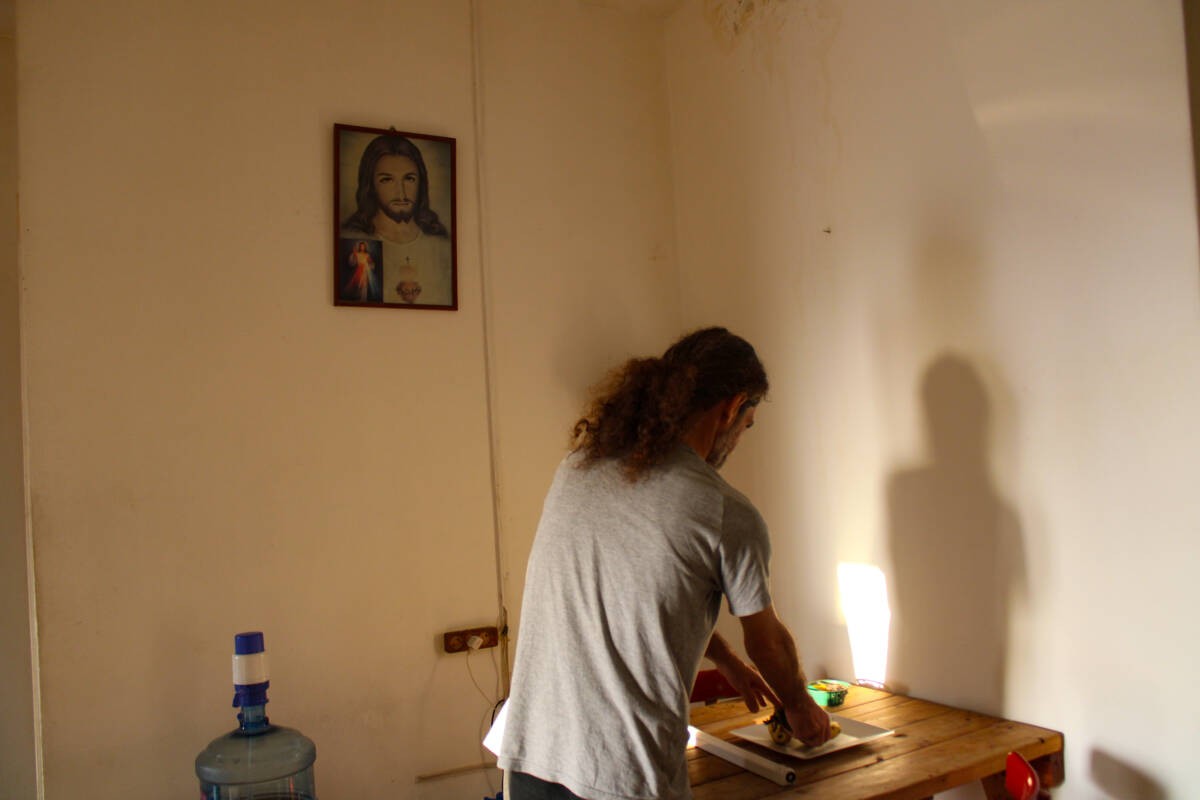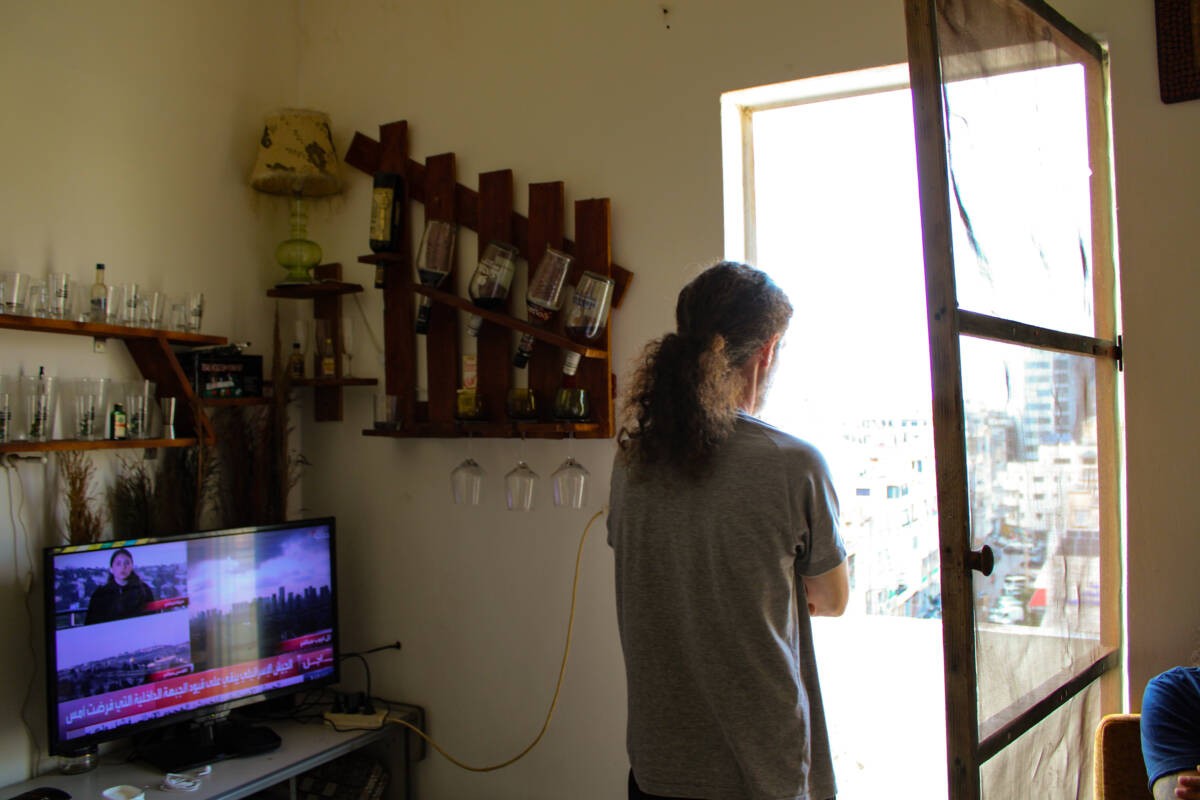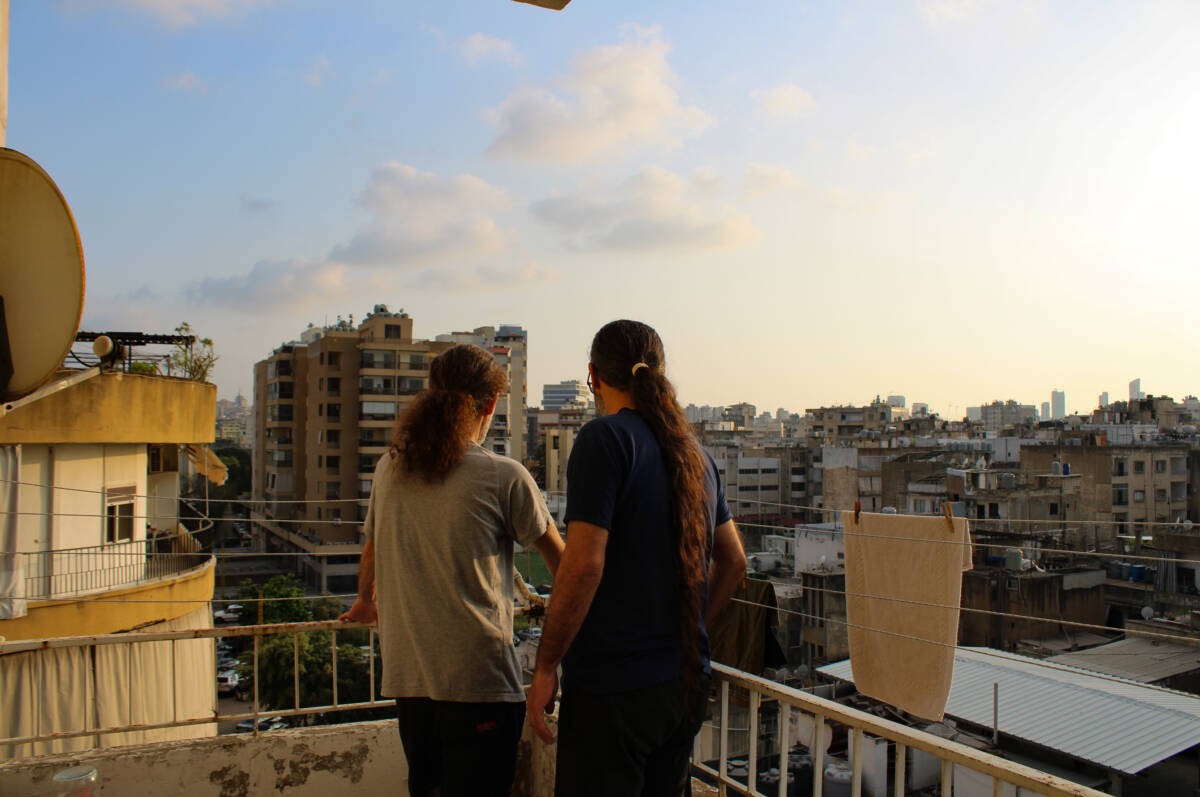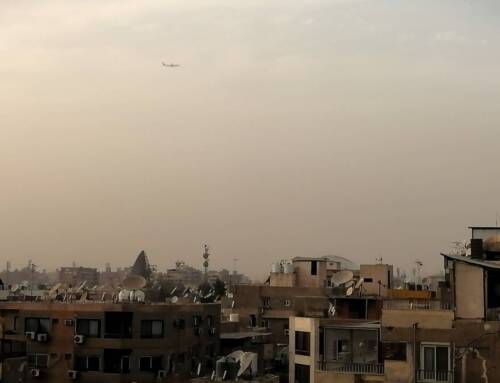Fear grips Syrian communities as violence surges in Lebanon
The killing of a member of a right-wing Christian political party in Lebanon last week, attributed by the army to Syrian carjackers, unleashed a torrent of violence and threats against refugees, leaving many afraid to leave their homes.
17 April 2024
BEIRUT — For the seventh evening in a row, Abed and his brother George watched the sunset on Sunday from their small balcony in Burj Hammoud, a historically Armenian town just east of Beirut. The brothers, who fled to Lebanon from Homs in 2015, had not left their apartment for a week, too afraid to venture into the streets below where violence against Syrians has spiked.
It began with the killing of Pascal Sleiman, a senior official of the Lebanese Forces (LF), a right-wing Christian political party opposed to the Syrian regime and its Lebanese ally, Hezbollah. The Lebanese army said Sleiman was abducted and killed in a carjacking attempt on April 7 by Syrian gang members who later transported his body to Syria. The LF party, meanwhile, has called his death a “political assassination until proven otherwise.”
Sleiman’s killing sparked a wave of xenophobia and hate crimes against Syrians in Lebanon, a country where anti-refugee sentiment was already soaring.
“It’s like house arrest,” 43-year-old Abed told Syria Direct. “It has become very frightening for Syrians to leave their houses.” Both brothers asked to be identified only by their first names for safety reasons.
When information spread about the reported involvement of Syrians in Sleiman’s death last week, supporters of the LF and other right-wing parties took to the streets throughout Lebanon, attacking Syrian refugees, the Access Center for Human Rights (ACHR), a human rights organization based in Beirut and Paris, reported.
Over the following days, dozens of Syrians were assaulted and threatened with expulsion by Lebanese residents of predominantly Christian areas. At the same time, the Lebanese police and army clamped down on Syrians, closing businesses, confiscating motorcycles and evicting Syrians without residency documents on the basis of pre-existing government orders.
On April 15, the governor of Lebanon’s North governorate announced a ban on “gatherings of displaced Syrians,” following in the footsteps of municipalities that enforced bylaws restricting Syrians’ movement in the aftermath of Sleiman’s killing.
“We have emphasized to the security forces the necessity of strict enforcement of Lebanese laws on Syrian refugees,” Lebanon’s caretaker Interior Minister Bassam Mawlawi said after an emergency meeting on April 9. “The Syrian presence is unacceptable and Lebanon cannot bear it, and it is obvious that many crimes are committed by Syrians.”
Attacks and threats
On April 10, a group of Lebanese men in Bourj Hammoud decided to take matters into their own hands. Riding motorcycles and using a loudspeaker, they gave Syrians 48 hours to evacuate their homes and shops in the neighborhood, or else face consequences. Although the threat never materialized, it sent a chill through the town’s Syrian community.
Abed has seen the videos circulating on social media of Syrians being attacked and publicly humiliated in the street. He also said he witnessed an assault “with my own eyes.”
On the evening of Monday, April 8—the day news of Sleiman’s killing spread—a group of about six young men jumped a Syrian walking alone near Abed’s apartment building, he recounted. He watched as they beat him for around five minutes, he said.
The LF party has condemned “barbaric” violence against Syrians, while calling for Syrian refugees to leave the country.
Syrians suspect the involvement of members of gang-like groups such as Jnoud al-Rab (Soldiers of God) in attacks on Syrians. Jnoud al-Rab is a Christian extremist group that patrols the predominantly Christian neighborhood of Ashrafieh, an LF stronghold.
Abed and his brother are Christian, which he feels has afforded them slightly more protection from his Lebanese Christian neighbors, compared to some of his Muslim Syrian friends. Still, when Abed saw the April 8 attack in the street below his apartment, he quickly switched off the lights, worried the assailants might notice him looking and come upstairs to raid his apartment.
“Even if they [neighbors] reassure you, you are still afraid,” he said. Abed and his brother are even cautious when watching sunsets from their balcony. “You might not be able to go out on the balcony, because if your neighbor is bothered by you he might make a problem with you,” he said.

Abed said being Christian has afforded him and his brother slightly more protection from his Lebanese Christian neighbors in Bourj Hammoud during the recent wave of anti-refugee violence, compared to some of his Muslim Syrian friends, 14/04/2024 (Hanna Davis/Syria Direct)
Scapegoats for economic woes
Weeks before Sleiman’s killing, anti-Syrian sentiments had been simmering for weeks in Lebanon “in the form of media campaigns, incendiary statements by politicians and simmering resentment on the streets,” Synaps Network, a Lebanon-based research institution, posted on X (formerly Twitter).
Around 1.5 million Syrian refugees and some 11,645 refugees of other nationalities currently reside in Lebanon. The country hosts the largest number of refugees per capita and per square kilometer in the world.
Lebanon is also in the grips of a severe economic crisis that has thrust much of its middle class into poverty since 2019. Growing wealth inequalities have fueled resentment, mainly directed towards Syrians and the aid sector that supports refugees, as lower-income Lebanese citizens compete with Syrians for arduous, previously undesirable jobs.
“We are therefore witnessing a symbolically-charged shift away from a clear division of labor,” Synaps wrote on X last week. While Syrians once “only filled positions that Lebanese didn’t want,” now “Syrians are seen as double-dipping, encroaching on dwindling Lebanese resources while enjoying foreign aid.”
Meanwhile, Lebanese politicians blame Syrians for the country’s economic woes. “The shameful scapegoating of the refugee population by Lebanese officials is fueling the rise in anti-Syrian sentiment, which has translated into violence against Syrians,” Ramzi Kaiss, Human Rights Watch’s Lebanon researcher, told Syria Direct.
“We have received multiple reports of Syrians living in fear, or leaving their homes, as a result of the threats levied against the refugee population following the events of last week,” he added, referring to Sleiman’s killing.
During the funeral mass for Sleiman on April 12, Maronite Patriarch Bechara al-Rai referred to “the danger” Syrian refugees represent in Lebanon. “The criminals are Syrian refugees who were welcomed by the Lebanese,” al-Rai said, as quoted by the Lebanese French daily L’Orient-Le Jour.
The day of the funeral, ACHR reported that armed LF and Kataeb Party supporters in Ashrafieh and Bourj Hammoud assaulted two Syrian refugees, leaving one hospitalized.
Home invasion
While some Syrians have been assaulted in the street, others are not safe in their homes. On the night of April 9, a group of around four young men broke into 28-year-old Hussein’s home in Geitawi, a neighborhood in Ashrafieh, he told Syria Direct.
Hussein was not at home when the men broke in. His neighbors heard the noise coming from his apartment, went to investigate and found the intruders inside, he said, asking to be identified only by his first name.
When he came home that night, Hussein found “everything smashed,” he recalled. “The door was open, there was broken glass on the floor.” His refrigerator was knocked over, and his two cats were missing, having run out of the house when the intruders entered.
Hussein has lived in Geitawi since he fled Syria in 2014. He is a “well-known” Syrian in the area, which is why he believes the men raided his home. For two nights after the incident, he was afraid to sleep at home, and slept at the language center where he teaches Arabic. “It’s definitely stressful,” he said.
Lebanon’s predominantly Christian neighborhoods in east Beirut are strongholds for right-wing Christian political parties such as LF and Kataeb, also known as the Phalanges. These areas saw the bulk of attacks on Syrians since Sleiman’s killing last week.
Hussein is now contemplating packing his bags, leaving the life and community he has built in Geitawi over the years and moving to Hamra, a neighborhood in west Beirut.
‘Most Syrians in Lebanon will be deported’
As Syrians face violence in the streets, Lebanese authorities are doubling down on efforts to deport refugees. On March 5, the government announced a “roadmap to regulate the status of displaced Syrians,” which calls for a “voluntary return” convoy to be organized soon, among other measures aimed at reducing the country’s Syrian population.
In October 2022, the Lebanese government resumed what it called a “voluntary return” plan, aiming to send back 15,000 Syrian refugees per month under the contention that Syria is safe for return. Since then, the number of Syrian refugees deported from Lebanon has spiked.
Read more: Detained, deported, disappeared: Assad’s critics face ‘nightmare’ in Lebanon
Lebanon’s cartaker Prime Minister Najib Mikati said in a meeting with Maronite Patriarch al-Rai on April 13 that “most of the Syrians in Lebanon” will be “deported” once the international community deems parts of Syria safe for return. A Cyprus government proposal for the European Union to recognize safe zones in Syria is currently gaining traction among EU member states.
The number of Syrians deported from Lebanon has been rising. Last year, ACHR documented 1,080 arbitrary arrests and the deportation of 763 Syrians. In 2022, just 154 Syrians were deported, and 59 in 2021. The rights group has also documented how in some cases the Lebanese army handed refugees who were at risk of persecution and torture directly over to the Syrian authorities.
“For years, Syrians in Lebanon have been subjected to discriminatory practices, serious violations of their rights and coercive measures designed to force them to return to Syria, which remains unsafe,” HRW’s Kaiss said.
The vast majority of Syrians in Lebanon do not have formal residency, in part due to stringent renewal procedures. Lebanon also ordered the United Nations’ Refugee Agency (UNHCR) to stop registering Syrians in 2015.
One LF official, who spoke to Syria Direct on condition of anonymity, said “Lebanon is suffocating and the crisis of the Syrians present in Lebanon should be properly addressed.” He added that “Lebanon is not a country for refugees, it is a country for passage [transit].”
The official argued that Syrian refugees in Lebanon should be “relocated somewhere else” and that because the country is not a signatory to the 1951 Refugee Convention, it is “not bound” to accept more refugees. “Lebanon has welcomed millions of refugees and tried to protect them from the disasters happening in Syria, but they cannot remain here forever,” he said.
While Lebanon is not a signatory to the Refugee Convention, under customary international law it is obligated to adhere to principle of non-refoulement, under which no person may be returned to a state where they face a threat of torture or persecution. Refoulement is also barred by the Convention Against Torture, which Lebanon has signed.

Abed sometimes worries even walking out onto his balcony could cause problems with his neighbors in Burj Hammoud, 14/04/2024 (Hanna Davis/Syria Direct)
‘Imprisoned at home’
From his balcony, Abed peered out to the east Beirut cityscape on Sunday. He pointed to an area in Burj Hammoud, known as al-Nabaa, where he heard “a bunch of Syrians were dragged off the streets” and deported on the evening of Thursday, April 11. Syria Direct was not able to independently verify the incident.
Even before the wave of violence unleashed by Sleiman’s killing, Abed and his brother had restricted their movements for fear of deportation.
If they returned to Syria, they would face prosecution for avoiding Syria’s military draft. Both were called up for the reserves after the start of the 2011 revolution, but did not enlist. Abed said his older brother, 45-year-old George, was already detained for 15 days in Syria because he refused the draft. The brothers are currently applying for visas in the hope of leaving for France.
In the meantime, the fear of deportation and violence on the streets below keeps them “imprisoned at home,” Abed said, turning to gaze at the setting sun.
*Correction (4/18/2024): This report initially identified Hussein as an English teacher. He teaches Arabic. Syria Direct regrets the error.







